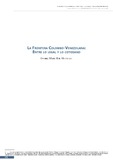| dc.rights.license | http://creativecommons.org/licenses/by-nc-sa/3.0/ve/ | |
| dc.contributor.author | Ruíz Uzcátegui, Dyanna María | |
| dc.date.accessioned | 2018-02-14T20:19:42Z | |
| dc.date.available | 2018-02-14T20:19:42Z | |
| dc.date.issued | 2017-05 | |
| dc.identifier.issn | 0798-3069 | |
| dc.identifier.uri | http://www.saber.ula.ve/handle/123456789/44350 | |
| dc.description.abstract | El proceso de globalización ha conducido a profundizar las desigualdades entre naciones, lo que se ha visto
evidenciado en las zonas de frontera. Esto ha contribuido a que se produzcan transformaciones institucionales con el fin
de fortalecer la seguridad en estos socioespacios. Sin embargo, en el caso de la frontera colombo-venezolana, se observa
una brecha cada vez más amplia entre la normativa que se ha establecido en los acuerdos formales y la cotidianidad que
presenta la zona, lo que podría estar generando confusión en las personas que habitan estos espacios, acerca de cuál es
la línea que separa lo legal de lo ilegal. En este trabajo, se realiza un breve contraste entre la normativa institucional
y los discursos que manejan los especialistas en los temas de frontera, como el de los catedráticos de universidades en
Colombia y en Venezuela, el de políticos y el de algunas autoridades y personas que viven en la zona. Específicamente, se
revisa la situación del contrabando de extracción de gasolina. Para llevar a cabo esta investigación se examinan la
Constitución, los Planes Nacionales y las leyes de frontera de ambos países. Asimismo, se analizan vídeos, material
bibliográfico y hemerográfico relacionados con la temática a tratar. | es_VE |
| dc.language.iso | es | es_VE |
| dc.publisher | Venezuela | es_VE |
| dc.rights | info:eu-repo/semantics/openAccess | |
| dc.subject | Frontera | es_VE |
| dc.subject | Colombia | es_VE |
| dc.subject | Venezuela | es_VE |
| dc.subject | Contrabando de Gasolina | es_VE |
| dc.title | La Frontera Colombo-Venezolana: Entre lo Legal y lo Cotidiano | es_VE |
| dc.title.alternative | The Venezuelan-Colombian Border: Between the legal and the routine | |
| dc.type | info:eu-repo/semantics/article | |
| dc.description.abstract1 | The globalization process has deepened the inequality gap among nations, situation that is more evident in those
limiting areas in border zones. This fact has contributed to the emergence of institutional transformations with the aim
to strengthen safety in these socio-spaces. However, in the case of the Venezuelan-Colombian border, a more profound
breach can be observed between the regulations and policies established by formal agreements and the routine common in
this region, which could be generating confusion in the people living in this area in relation to the line separating the
legal from the illegal. In this work, a brief contrast is carried out between the institutional conventions and the
speeches the specialists in border themes discuss, like those from scholars at Universities in both Venezuela and
Colombia, politicians and some authorities, and people from this border region. The situation with extracted gas/oil
contraband is specifically revised. To accomplish this research The Constitutions, The National Plans and the set of laws
regarding border issues for both countries are examined. Likewise, some videos, bibliographic material and magazines are
also analyzed. | es_VE |
| dc.description.colacion | 375-383 | es_VE |
| dc.description.email | dyannaruiz@ula.ve | es_VE |
| dc.description.frecuencia | Cuatrimestral | |
| dc.publisher.pais | Venezuela | es_VE |
| dc.subject.centroinvestigacion | Centro de Investigaciones en Ciencias Humanas (HUMANIC) | |
| dc.subject.facultad | Facultad de Humanidades y Educación | es_VE |
| dc.subject.keywords | Border | es_VE |
| dc.subject.keywords | Venezuela | es_VE |
| dc.subject.keywords | Colombia | es_VE |
| dc.subject.keywords | Gas/oil Contraband | es_VE |
| dc.subject.publicacionelectronica | Revista Fermentum | |
| dc.subject.seccion | Revista Fermentum: | es_VE |
| dc.subject.thematiccategory | Artes y Humanidades | es_VE |
| dc.subject.tipo | Revistas | es_VE |
| dc.type.media | Texto | es_VE |


